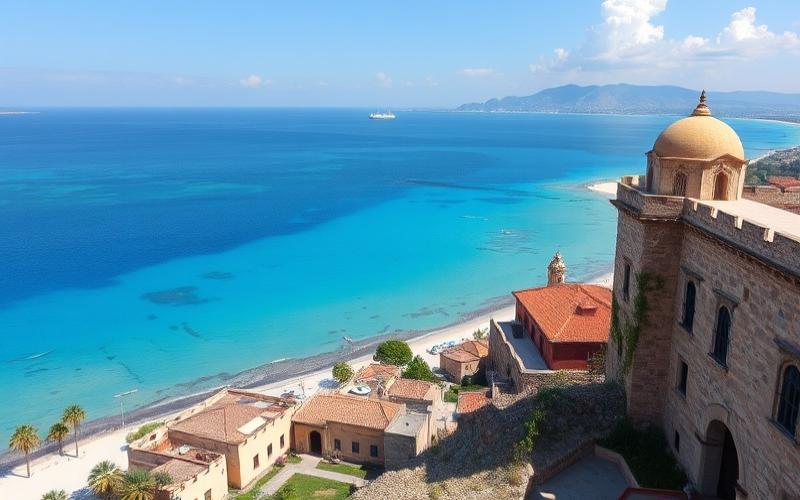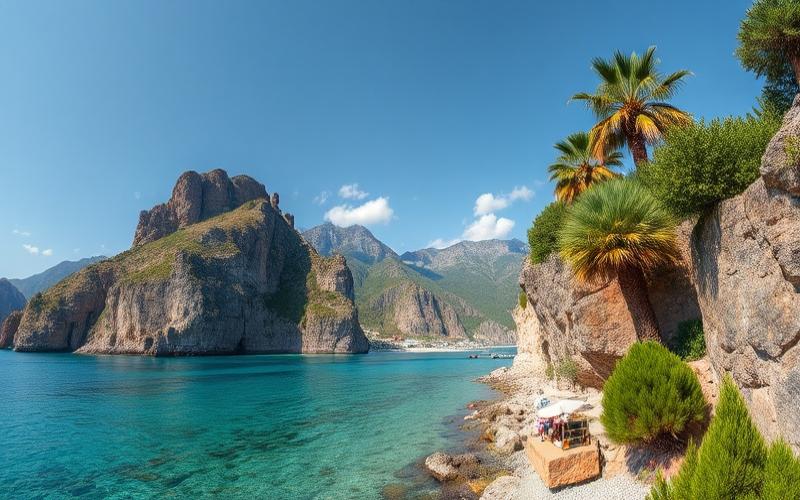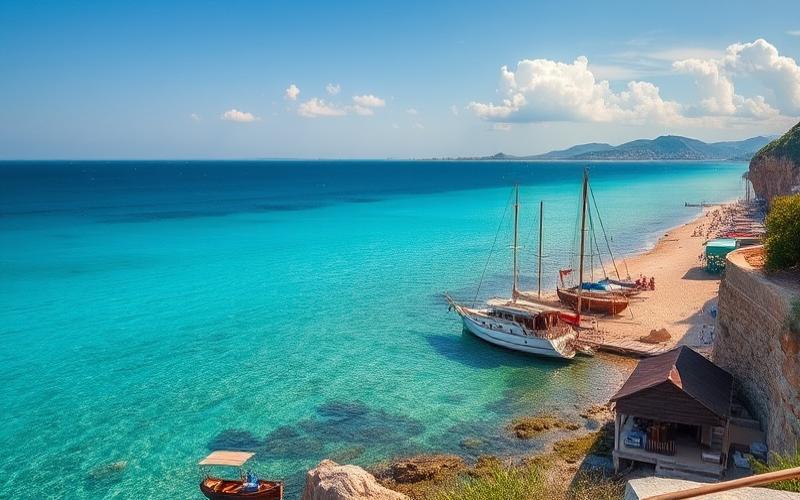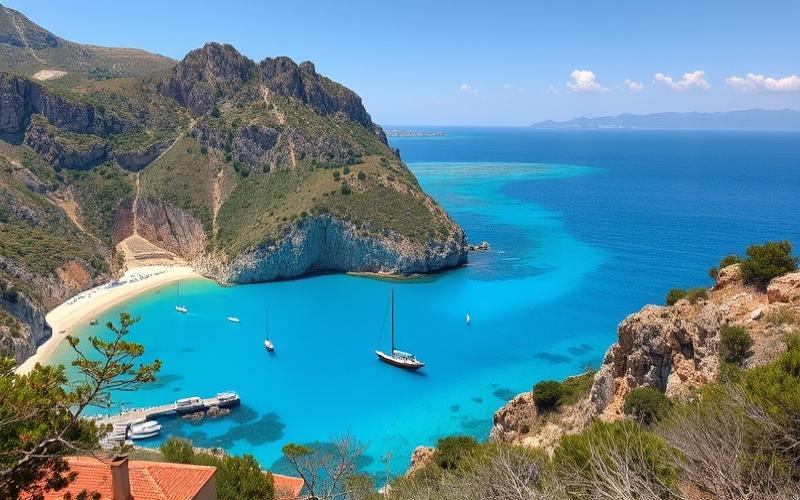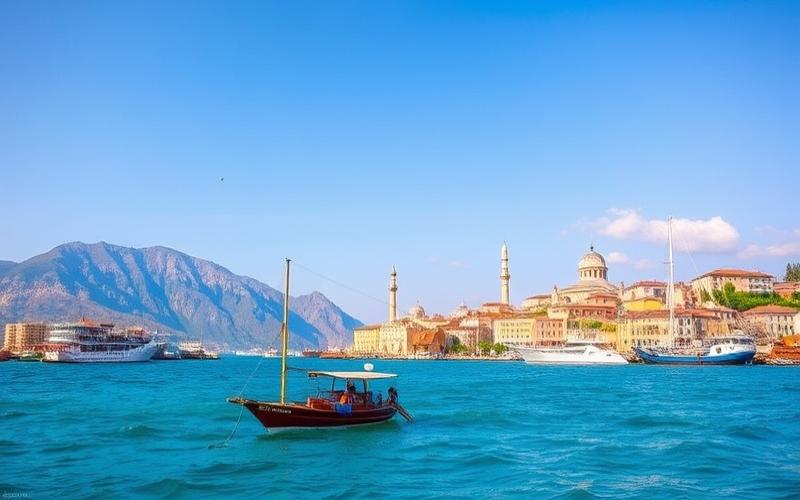
 Published on and written by Cyril Jarnias
Published on and written by Cyril Jarnias
Turkey, with its extensive coastline and numerous freshwater bodies, offers abundant opportunities for fishing enthusiasts. However, before enjoying this popular activity, it’s crucial to understand the essential procedures for obtaining a fishing permit in this country.
From the Aegean Sea to the Black Sea, authorized zones vary, and local regulations can quickly become complex. This article aims to demystify the administrative steps to enable you to fish legally, while considering applicable restrictions and regional specificities.
Whether you’re an experienced angler or an enthusiastic beginner, it’s imperative to know the specific rules governing your rights and responsibilities as a fisherman in Turkish waters.
Detailed Procedures for Obtaining a Fishing Permit in Turkey
Steps to Obtain a Fishing Permit in Turkey
1. Determine the Required Permit Type:
- Commercial Fishing Permit: Mandatory for all professional activities, for vessels or companies wishing to exploit fishery resources commercially.
- Recreational/Amateur Fishing Permit: For individuals fishing as a hobby, in compliance with authorized quotas and periods.
2. Prepare Required Documents:
Commercial Fishing:
- Identification card or passport.
- Fishing vessel registration.
- Information file about the activity and equipment used.
- Vessel insurance proof.
Recreational Fishing:
- Identification card or passport.
- Application form.
3. Where to Apply:
Commercial Permit:
- Ministry of Agriculture and Forestry – General Directorate of Fisheries and Aquaculture.
- Applications must be made in person at regional or provincial ministry offices.
Recreational Permit:
- Local Governorates (Valilik) or District Administrations (Kaymakamlık).
- Some tourist areas offer simplified procedures through tourism offices or local agencies.
4. Associated Fees:
- Commercial Permit: Variable amounts depending on vessel size, fishing capacity, and operating area.
- Recreational Permit: Generally modest, with amounts updated annually by local administration.
5. Verification and Approval Process:
- Document check and compliance verification of provided information.
- Verification of quota compliance, authorized fishing gear, and activity area.
- For commercial fishing: possible vessel inspection before permit issuance.
- Typical timeframe: from a few days to two weeks depending on administrative workload and region.
6. Processing Times:
- Commercial Fishing: 1 to 2 weeks after submitting complete application.
- Recreational Fishing: 1 to 5 business days, often issued immediately for simple applications.
Comparison Table of Fishing Permits in Turkey
| Permit Type | Required Documents | Where to Apply | Processing Time | Estimated Fees |
|---|---|---|---|---|
| Commercial | ID, registration, insurance, activity file | Ministry of Agriculture (regional offices) | 1-2 weeks | Variable, often high |
| Recreational/Amateur | ID, application form | Governorate, District Administration | 1-5 days | Low, modest |
Specific Regulations
- Authorized Fishing Zones: Certain maritime areas, lakes, and rivers may be closed or restricted according to seasons or for species protection. Compliance with local signage and regulations is mandatory.
- Fishing Seasons: Annual closed periods are imposed for certain species or areas to ensure fishery stock sustainability.
- Gear and Quotas: Use of specific gear is regulated (net sizes, number of lines, etc.) and catch quotas are set for recreational fishing.
- Penalties: Non-compliance with rules (lack of permit, exceeding quotas, fishing outside authorized periods) may result in significant fines and equipment confiscation.
Useful Contacts and Recourse for Issues
Ministry of Agriculture and Forestry
General Directorate of Fisheries and Aquaculture
For any questions or claims regarding commercial permit acquisition.
Local Governorates (Valilik) / District Administrations (Kaymakamlık)
For recreational permits or any difficulties during application.
Possible Recourse:
- In case of unjustified refusal or administrative issues, appeals can be filed with the ministry’s fisheries department or relevant governorate.
- Possible consultation with a lawyer specialized in maritime law or Turkish administrative law for assistance.
Additional Information
- Most procedures must be completed in person, and online information availability is limited, particularly for recreational fishing.
- It’s strongly advised to prepare documents in advance and inquire locally about the latest regulations and current fishing seasons.
- Inspections are frequent, especially in tourist and maritime areas.
Good to Know:
To obtain a fishing permit in Turkey, you must first determine the desired permit type: amateur or professional, each having specific regulations regarding authorized fishing zones and seasons. Procedures begin with submitting an application, either online via the Ministry of Agriculture and Forestry website or by visiting regional fisheries management offices. Required documents include a valid ID, proof of residence, and a completed application form. Fees vary by permit type, approximately 100 to 200 TRY for amateurs. After submission, verification and approval typically take between one and two weeks. If issues arise, contact the mentioned offices or consult their websites for detailed instructions. Fishing zones and seasons are strictly regulated in Turkey, and it’s crucial to respect these regulations to avoid fines.
Authorized Fishing Areas in Turkey
Turkey permits fishing in several distinct geographical areas, including its territorial waters (Black Sea, Aegean Sea, Mediterranean Sea, and Sea of Marmara), as well as numerous nationally significant lakes and rivers such as Lake Van, Lake Tuz, Kızılırmak River, and the Euphrates.
| Geographical Area | Specific Examples | Authorized Fishing Types | Main Local Regulations |
|---|---|---|---|
| Territorial Waters | Black Sea, Aegean Sea, Mediterranean Sea, Sea of Marmara | Commercial Recreational Sport | Licenses mandatory per activity. Closed seasons for certain species. Restrictions on gear used. |
| Lakes | Lake Van, Lake Tuz | Recreational Sport | Strict quotas. Seasonal prohibition periods. |
| Rivers | Kızılırmak, Euphrates | Recreational Sport | Permit required. Fishing prohibited during fish spawning. |
Local Regulations by Fishing Type:
Commercial Fishing
- Requires license issued by Turkish Ministry of Agriculture and Forestry.
- Mandatory vessel registration.
- Strict compliance with annual quotas and seasonal restrictions (e.g., annual closure for certain migratory fish).
- Limitation on gear types to prevent overfishing.
Recreational Fishing
- Individual permit to obtain from local governorates or departmental administrations.
- Daily catch limits.
- Prohibition periods imposed during spawning or to protect vulnerable species.
Sport Fishing
- Subject to specific regulations during official competitions.
- Mandatory compliance with closed seasons and minimum legal sizes.
Concrete example:
In the Black Sea or Eastern Mediterranean, bluefin tuna fishing is subject to strict seasonal closure each year to ensure natural stock regeneration. Specific periods vary by target species but are communicated annually by competent authorities.
Responsible Authorities:
The main managing body is the Turkish Ministry of Agriculture and Forestry, which issues commercial licenses as well as national recreational permits.
For certain inland waterways or specific protected areas: management delegated to local governorates or relevant provincial directorates.
Good to Know:
In Turkey, fishing is authorized in various geographical areas, including the Aegean Sea, Black Sea, Sea of Marmara, and Mediterranean Sea, as well as lakes such as Lake Van and Lake Tuz, and rivers like Kızılırmak and Euphrates. Each of these areas is subject to specific regulations according to fishing type: commercial, recreational, or sport. For example, commercial fishing in the Black Sea is strictly regulated with quotas and moratorium periods to protect fish stocks, while recreational fishing can be practiced more freely but still requires a permit. Additionally, restriction periods, particularly during spawning season, are imposed to maintain marine sustainability. The Ministry of Agriculture and Forestry, through its General Directorate of Fisheries and Aquaculture, is responsible for management, monitoring, and allocation of fishing rights, ensuring compliance with local regulations and preservation of aquatic resources.
For any fishing activity in Turkey—whether commercial or recreational—it’s imperative to:
- Obtain a permit appropriate for your fishing type
- Strictly respect established quotas
- Comply with local seasonal bans aimed at preserving fishery stocks
Non-compliance may result in significant administrative or even criminal fines.
Restrictive periods are generally specified each year in a ministerial decree; they particularly concern:
- The spring period when many marine species spawn,
- Certain inland regions where drought increases their vulnerability,
- Sensitive areas around river estuaries particularly protected against any form of pollution related to intensive fishing.
In summary:
Legal and sustainable practice in all these areas requires constant vigilance regarding the evolving regulatory framework primarily managed by the competent Turkish ministry.
Guide for Expatriate Anglers in Turkey
Administrative Procedures for Expatriates
To practice fishing in Turkey, it’s essential to distinguish between commercial and recreational fishing:
- Recreational Fishing: Permits are issued by local governorates or district administrations. Applications are generally made in person with competent authorities.
- Commercial Fishing: Licenses are managed by the Ministry of Agriculture and Forestry. They require vessel registration, complete administrative file, and strict compliance with quotas and seasons.
Required Documents for Expatriates (Recreational Fishing)
- Valid passport (original + copy)
- Turkish residence permit if applicable
- ID photographs
- Completed application form (available at counter)
- Administrative fee payment
Authorities to Contact
| Procedure | Responsible Authority |
|---|---|
| Recreational Fishing | Local Governorate / District Administration |
| Commercial Fishing | Ministry of Agriculture and Forestry |
Estimated Permit Cost
Price varies by region, activity type (recreational or commercial), and desired duration. For local recreational activity, generally budget between 50 to 150 TRY/year.
Authorized Areas & Seasons
Authorized areas mainly include:
- Mediterranean coastline, Aegean Sea, Black Sea
- Inland lakes like Abant or Beyşehir
- Certain rivers under local conditions
Regulated Seasons:
High season generally runs from September to March for most migratory marine species. There are also temporary bans on certain species during their reproduction period – always check with local authorities before any outing.
Practical Tips for Expatriates
List of Tips:
- Prepare all your documents in duplicate.
- Learn a few Turkish keywords related to fishing (“balık” = fish; “izin” = permit).
- Don’t hesitate to be accompanied by a Turkish friend during application submission to avoid language misunderstandings.
To facilitate your integration into local communities:
- Participate in group outings organized by local clubs (“balıkçı kulübü”).
- Scrupulously respect customs around fish or equipment sharing.
- Show interest in culinary traditions related to local fishing (preparation, tasting).
Additional tip: Most Turks don’t speak fluent English outside major cities. Therefore use Google Translate offline if needed during administrative procedures.
Good to Know:
To obtain a fishing permit in Turkey, expatriates should contact the Ministry of Agriculture and Forestry, presenting a copy of their passport and proof of residence; cost generally ranges between 50 and 100 EUR depending on permit type. Authorized areas include the Aegean, Mediterranean, Black, and Marmara Seas, with regulated seasons for each species; be vigilant about closure periods for stock preservation. To overcome cultural and language barriers, it may be helpful to familiarize yourself with Turkish keywords specific to fishing and join local fishing clubs, which facilitates integration and exchange of advice on best practices.
Tips for Complying with Turkish Fishing Regulations
Practical Tips for Complying with Turkish Fishing Regulations
Required Permit Types:
- Recreational Fishing: An individual permit is mandatory for line fishing from shore or boat, even for non-commercial activity. Children are generally exempt, but adults must always verify their status.
- Commercial Fishing: A professional license is required. It demands vessel registration, cooperative membership, and strict compliance with assigned quotas and zones.
- There are also special authorizations depending on area (inland waters, Mediterranean Sea, Black Sea) or certain protected species.
Quotas and Minimum Legal Sizes (concrete examples):
| Species | Minimum Size (cm) | Typical Daily Quota |
|---|---|---|
| Sea Bass (Dicentrarchus labrax) | 25 | 5 |
| Gilthead Seabream | 20 | Variable |
| Bluefin Tuna | Specific per campaign and under international quotas | – |
Exceeding these limits may result in equipment seizure and heavy fines.
Authorized/Prohibited Equipment:
- Authorized: Classic fishing rod with limited number of hooks; specific nets clearly identified for professional use with official marking.
- Prohibited:
- Drift nets without declaration
- Explosives
- Toxic or anesthetic substances
- Electric fishing
Time of Year & Weather Conditions:
- Many species have closed periods during their reproduction (e.g., bluefin tuna ban between May and June).
- Dates vary by region; therefore it’s crucial to consult the official calendar each year.
- Certain extreme weather conditions may lead to temporary bans decided by local decree.
Importance of Staying Informed About Legislative Updates:
Regulations regularly evolve based on scientific studies about fishery stock status and national/international environmental context.
It’s imperative to frequently consult:
- The official website of Turkish Ministry of Agriculture and Forestry — Fisheries section
- Local or international specialized publications validated by authorities
- Municipal decrees posted in ports
Concrete Application Examples:
An amateur angler wishing to catch three sea bass on the Aegean coast must ensure each measures at least twenty-five centimeters. They check their quota before each session via the government website or local cooperative. Before a spring outing in the Black Sea, they consult the annual calendar to avoid any temporary prohibition period related to spawning.
A professional wanting to exploit a new area submits their official application to the competent ministry with all administrative justifications; they equip their vessel only with approved material during regular inspections conducted by coast guards.
Scrupulously respecting these rules not only protects your activity from legal risks but actively contributes to the ecological sustainability of Turkish marine resources.
Good to Know:
To comply with fishing regulations in Turkey, it’s crucial to understand the different required permit types, such as recreational permits for amateurs and commercial permits for professionals. Each category has its own rules, including quotas and minimum legal sizes for species like hake and tuna. Using appropriate equipment is also essential: drift nets are prohibited in certain contexts, while fishing rods are often preferred for recreational fishing. Seasonality plays an important role, as certain periods prohibit fishing of specific species to protect reproduction, particularly during summer months. Ensure regular consultation of resources such as Turkish government websites and local publications to stay informed about potential legislative changes. For example, consulting the Ministry of Agriculture and Forestry website can provide updated bulletins, helping you avoid heavy fines.
Disclaimer: The information provided on this website is for informational purposes only and does not constitute financial, legal, or professional advice. We encourage you to consult qualified experts before making any investment, real estate, or expatriation decisions. Although we strive to maintain up-to-date and accurate information, we do not guarantee the completeness, accuracy, or timeliness of the proposed content. As investment and expatriation involve risks, we disclaim any liability for potential losses or damages arising from the use of this site. Your use of this site confirms your acceptance of these terms and your understanding of the associated risks.






























